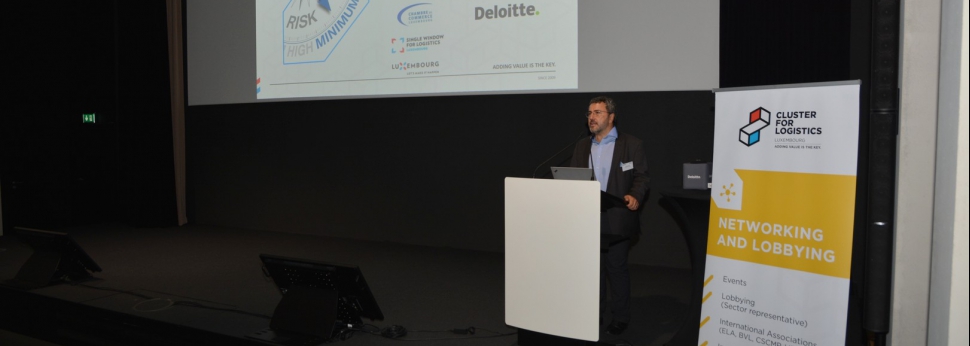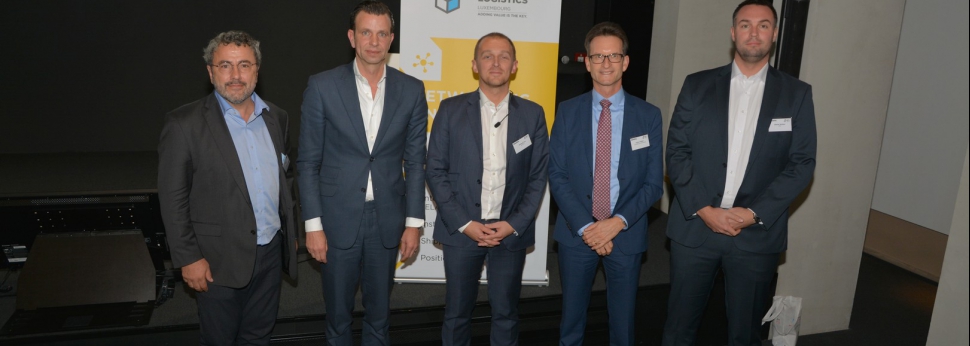Luxembourg can serve as Plan B for the logistics sector during crisis periods
The resistance to shocks and the adaptation of logistics processes was on the agenda of the Cluster for Logistics' “Change Management and Resilience in Supply Chain conference” on October 10th 2019. The conference organized at Sponsor Deloitte Luxembourg attracted around 40 participants interested in optimising the supply chain during periods of uncertainty. The speakers emphasized the importance of a Plan B and Luxembourg proves to be a solid place against logistics risks. In addition, recruiters can find varied and flexible talents to improve their processes in the face of economic crises.
Supply chains are under pressure and have undergone the most dramatic transformation in decades according to the Global Supply Chains report of The Economist of July 2019. The risks of recession, technological advances and nationalist political movements have affected the markets. The air cargo sector has been on the decline since the beginning of the year, impacted notably by the trade war between the United States and China.
The President of the Cluster for Logistics Carlo Thelen noted that the industry is requesting useful indicators during volatile periods. The Chamber of Commerce and the Cluster for Logistics seek to help companies navigate difficult times. The Cluster for Logistics has celebrated its 10th anniversary and the logistics sector continues to grow in Luxembourg. Since 2013, the number of square meters dedicated to logistics activities has increased by 280,000 square meters. But there will be no competitive industry without logistics prepared for difficult times. Luxembourg needs to focus on digitalisation and attracting talent in order to become a regular player in the Top 10 in Europe.
Daniel Küster, Associate Partner & Global at DHL Consulting presented DHL's strategies for development and risk analysis. Headquartered in Bonn, the consulting company works mainly for DHL but also offers its services to customers to help them choose the best logistics location, improve flows or inventories. The traditional choice of a logistics hub focuses on customers' centers of gravity, with the main criteria being the quality of service and the reduction of costs. This choice is not the most judicious, however, according to Küster. By considering risk criteria for regions and suppliers, the ideal location for a logistics platform can vary considerably, and Luxembourg can take advantage of it.
The risks for the supply chain are many and varied: a hundred ranging from natural disasters, from political or social instability to structural problems impacting flows and production.
Luxembourg stays solid in the wake of risks
Luxembourg is a very good platform if we include these criteria, notes Küster. The DHL Resilience 360 platform gathers information on all countries and generates a "Score Card" with a risk index, ranging from 0, the lowest, to 100, the highest. Luxembourg is well placed in relation to its neighbours with a relatively low risk - 19 out of 100 - compared to the Netherlands (28), Belgium (31), Germany (32) and France (42). Recurring strikes in France and Germany have a negative impact on the total, says Küster. Even localised incidents such as the tornado at Bascharage in August are carefully documented as it caused a temporary disruption of the logistics chain and severe damage.
With these tools, a company can develop an agile model to respond quickly to interruptions and reduce crisis time, notes Küster. A frequent reassessment of the supply chain is however necessary to solidify the links.
Mickael Coq, Director of Deloitte's Operations Excellence & Human Capital, presented strategic adjustment opportunities as the economy moves from strong growth to reduced or negative growth. A poll among its with US clients showed that the vast majority is expecting a contraction in the US economy in the next two years. And the outlook in Europe and Asia is not much better. Business activities will be impacted, but clear and monitored KPIs are necessary to keep on overview of the big picture. Companies that are well prepared, able to invest in recessions and can maintain their talents are usually rebounding with the best growth rates, says Coq.
Reviewing processes at the procurement level is also crucial for companies, for Martin Kaltenbach, Global Managing Partner at IAC Partners, expert and consultant in Change Management. The consulting firm, which advises industrial and service firms, identifies ways to improve the purchasing process, a less visible but important aspect of the supply chain. Change management requires time-consuming thinking that impacts the company's culture, explains Kaltenbach. The company IAC Partners is currently expanding in Luxembourg and was happy to find a pool of talents that allowed them to significantly improve the processes of a customer.
Speakers: Malik Zeniti, Martin Kaltenbach, Mickael Coq, Carlo Thelen and Daniel Küster (from left to right)
Motivate employees to support Change management
Talent is at the center of business, especially in times of crisis. Change management requires an adapted management of the employees, underline all the speakers. Indeed, resistance to change is an emotional and normal reaction, says Kaltenbach. Accompanying all the actors and motivating them is therefore essential. On the other hand, it is the best talents who leave first if the transformation is poorly done. They are not only a resource but they are the future of a company, notes Mickael Coq.
In the face of technological change, Cluster for Logistics Director Malik Zeniti presented the current Cluster for Logistics projects. A dedicated ICT working group was launched in September to identify the needs of logistics and industrial companies as new technologies and their impact influence their decisions. During the conference, the Cluster for Logistics presented its discussion paper "Innovation Drivers for the Logistics Industry" in partnership with Single Window for Logistics which will be published on the website www.c4l.lu.
Download the Tech report "Innovation drivers for the Logistics Industry"
The Cluster for Logistics published a new report with new technologies that are shaping the future. The discussion paper highlights the measures and appraises the impact of emerging trends in Logistics.
The password to unlock this document: c4l2019
Download additional photos below. Copyright Cluster for Logistics










































































































































